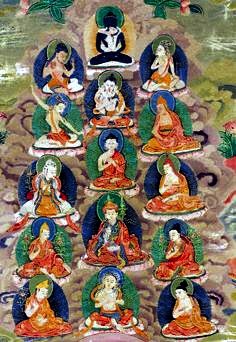Three lineages of transmission: Difference between revisions
Jump to navigation
Jump to search
(Tibetan phonetics.) |
mNo edit summary |
||
| (2 intermediate revisions by the same user not shown) | |||
| Line 2: | Line 2: | ||
'''Three lineages of transmission''' (Tib. བཀའི་བརྒྱུད་པ་གསུམ་, ''ké gyüpa sum'', [[Wyl.]] ''bka'i brgyud pa gsum'') — the three modes and stages of transmission of the three [[inner tantras]] of the [[Nyingma]] school, and in particular of the [[Dzogchen]] teachings. | '''Three lineages of transmission''' (Tib. བཀའི་བརྒྱུད་པ་གསུམ་, ''ké gyüpa sum'', [[Wyl.]] ''bka'i brgyud pa gsum'') — the three modes and stages of transmission of the three [[inner tantras]] of the [[Nyingma]] school, and in particular of the [[Dzogchen]] teachings. | ||
#the '''mind direct transmission of the [[buddha]]s''' (Tib. རྒྱལ་བ་དགོངས་བརྒྱུད་, ''gyalwa gong gyü'' | #the '''mind direct transmission of the [[buddha]]s''' (Tib. རྒྱལ་བ་དགོངས་བརྒྱུད་, ''gyalwa gong gyü'', Wyl. ''rgyal ba dgongs brgyud''): from the [[dharmakaya]] [[Samantabhadra]] to the [[sambhogakaya]] buddhas in the [[Akanishtha]] heaven, such as the [[buddhas of the five families]], and [[Vajrasattva]], and then to [[nirmanakaya]] buddhas such as the [[twelve teachers]]. | ||
#the '''sign transmission of the [[vidyadhara]]s''' (Tib. རིག་འཛིན་བརྡ་བརྒྱུད་, ''rigdzin da gyü'' | #the '''sign transmission of the [[vidyadhara]]s''' (Tib. རིག་འཛིན་བརྡ་བརྒྱུད་, ''rigdzin da gyü'', Wyl. ''rig 'dzin brda brgyud''): from Vajrasattva to the first human Dzogchen master [[Garab Dorje]], through to [[Padmasambhava]]. For the Dzogchen lineage, this includes masters such as [[Mañjushrimitra]], [[Shri Singha]], and [[Jñanasutra]]. | ||
#the '''oral transmission from special individuals''' (Tib. གང་ཟག་སྙན་བརྒྱུད་, ''gangzak nyen gyü'' | #the '''oral transmission from special individuals''' (Tib. གང་ཟག་སྙན་བརྒྱུད་, ''gangzak nyen gyü'', Wyl. ''gang zag snyan brgyud'')<ref>This lineage is also sometimes known as the '''oral transmission of the ascetics''' (Wyl. ''rnal 'byor snyan brgyud'').</ref>. In Tibet, the oral transmission of the Dzogchen teachings started with Padmasambhava, [[Vimalamitra]] and [[Vairotsana]], and has continued in an unbroken lineage to this day. | ||
==Alternative Translations== | ==Alternative Translations== | ||
| Line 14: | Line 14: | ||
==Notes== | ==Notes== | ||
<small><references/></small> | <small><references/></small> | ||
==Further Reading== | ==Further Reading== | ||
| Line 24: | Line 21: | ||
*[[Thinley Norbu]], ''The Small Golden Key'' (Shambhala Publications, 1999), pages 8-13. | *[[Thinley Norbu]], ''The Small Golden Key'' (Shambhala Publications, 1999), pages 8-13. | ||
*[[Tulku Thondup]], ''Masters of Meditation and Miracles'', edited by Harold Talbott (Boston: Shambhala, 1996), Part One, Three Modes of Lineal Transmission of the General Nyingma Inner Tantras. | *[[Tulku Thondup]], ''Masters of Meditation and Miracles'', edited by Harold Talbott (Boston: Shambhala, 1996), Part One, Three Modes of Lineal Transmission of the General Nyingma Inner Tantras. | ||
==Internal Links== | |||
*[[Seven lineages of transmission]] | |||
[[Category:Key Terms]] | [[Category:Key Terms]] | ||
[[Category:Schools and Lineages]] | [[Category:Schools and Lineages]] | ||
[[Category:Lineages]] | |||
[[Category:Nyingma]] | [[Category:Nyingma]] | ||
[[Category:Dzogchen]] | [[Category:Dzogchen]] | ||
[[Category:Enumerations]] | [[Category:Enumerations]] | ||
[[Category:03-Three]] | [[Category:03-Three]] | ||
Latest revision as of 11:04, 29 January 2024

Three lineages of transmission (Tib. བཀའི་བརྒྱུད་པ་གསུམ་, ké gyüpa sum, Wyl. bka'i brgyud pa gsum) — the three modes and stages of transmission of the three inner tantras of the Nyingma school, and in particular of the Dzogchen teachings.
- the mind direct transmission of the buddhas (Tib. རྒྱལ་བ་དགོངས་བརྒྱུད་, gyalwa gong gyü, Wyl. rgyal ba dgongs brgyud): from the dharmakaya Samantabhadra to the sambhogakaya buddhas in the Akanishtha heaven, such as the buddhas of the five families, and Vajrasattva, and then to nirmanakaya buddhas such as the twelve teachers.
- the sign transmission of the vidyadharas (Tib. རིག་འཛིན་བརྡ་བརྒྱུད་, rigdzin da gyü, Wyl. rig 'dzin brda brgyud): from Vajrasattva to the first human Dzogchen master Garab Dorje, through to Padmasambhava. For the Dzogchen lineage, this includes masters such as Mañjushrimitra, Shri Singha, and Jñanasutra.
- the oral transmission from special individuals (Tib. གང་ཟག་སྙན་བརྒྱུད་, gangzak nyen gyü, Wyl. gang zag snyan brgyud)[1]. In Tibet, the oral transmission of the Dzogchen teachings started with Padmasambhava, Vimalamitra and Vairotsana, and has continued in an unbroken lineage to this day.
Alternative Translations
- the mind-to-mind transmission by victorious ones
- the transmission through symbols by masters of awareness
- the oral transmission by human individuals
Notes
- ↑ This lineage is also sometimes known as the oral transmission of the ascetics (Wyl. rnal 'byor snyan brgyud).
Further Reading
- Chögyam Trungpa, Crazy Wisdom Seminar II: Karmê Chöling, 1972, The Collected Works of Chögyam Trungpa, Volume Five, Shambhala, 2004, '7. Dorje Trolö and The Three Styles of Transmission'.
- Nyoshul Khenpo, A Marvelous Garland of Rare Gems: Biographies of Masters of Awareness in the Dzogchen Lineage (Junction City: Padma Publications, 2005), 'I. The Lineage'.
- Patrul Rinpoche, The Words of My Perfect Teacher (Boston: Shambhala, Revised edition, 1998), 'Chapter Six, III. The History of the Advent of the Early Translation School', pages 332-347.
- Thinley Norbu, The Small Golden Key (Shambhala Publications, 1999), pages 8-13.
- Tulku Thondup, Masters of Meditation and Miracles, edited by Harold Talbott (Boston: Shambhala, 1996), Part One, Three Modes of Lineal Transmission of the General Nyingma Inner Tantras.